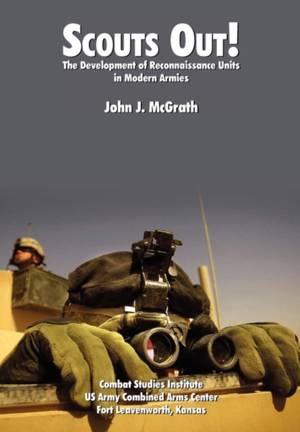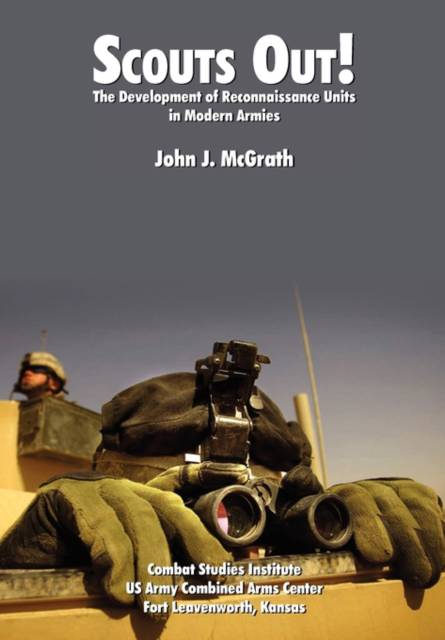
- Afhalen na 1 uur in een winkel met voorraad
- Gratis thuislevering in België vanaf € 30
- Ruim aanbod met 7 miljoen producten
- Afhalen na 1 uur in een winkel met voorraad
- Gratis thuislevering in België vanaf € 30
- Ruim aanbod met 7 miljoen producten
Zoeken
Scouts Out! The Development of Reconnaissance Units in Modern Armies
John J McGrath, Combat Studies Institute
Paperback | Engels
€ 16,95
+ 33 punten
Omschrijving
Originally published by the United States Army Combat Studies Institute Press in 2009, this monograph is a wide-ranging historical survey of the theory, doctrine, organization, and employment of reconnaissance units since the era of mechanization in the early 20th century. This study examines the development, role, and employment of units in modern armies designed specifically to perform reconnaissance and security (counterreconnaissance) missions. The analysis discerns common threads from the past. Conclusions are drawn from historical trends that may apply to future force development planning and unit operational employment. In the past, dedicated reconnaissance units were unique in their organization and capabilities due to the presence of the horse. This provided cavalry with a marked mobility differential over infantry and artillery. In the mechanized age, this monopoly on mobility vanished. Nonreconnaissance mechanized and motorized forces were equipped with similar weapons and vehicles. Reconnaissance units then became distinctive primarily by their organizational structure and specialized mission rather than by their equipment. This conceptual transformation has created a great dichotomy for modern reconnaissance forces. Should such forces be light or heavy? A lighter force might be able to conduct reconnaissance operations, at least theoretically, in a more nimble fashion, while a heavier force could defend itself when conducting reconnaissance and security operations. An additional consideration is the question as to what organizational level should dedicated reconnaissance forces be provided and used. This work examines these two major threads from a historical perspective since World War I.
Specificaties
Betrokkenen
- Auteur(s):
- Uitgeverij:
Inhoud
- Aantal bladzijden:
- 268
- Taal:
- Engels
Eigenschappen
- Productcode (EAN):
- 9781780390383
- Verschijningsdatum:
- 1/12/2010
- Uitvoering:
- Paperback
- Formaat:
- Trade paperback (VS)
- Afmetingen:
- 170 mm x 244 mm
- Gewicht:
- 430 g

Alleen bij Standaard Boekhandel
+ 33 punten op je klantenkaart van Standaard Boekhandel
Beoordelingen
We publiceren alleen reviews die voldoen aan de voorwaarden voor reviews. Bekijk onze voorwaarden voor reviews.








